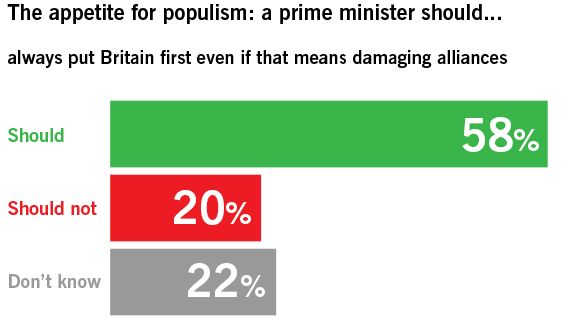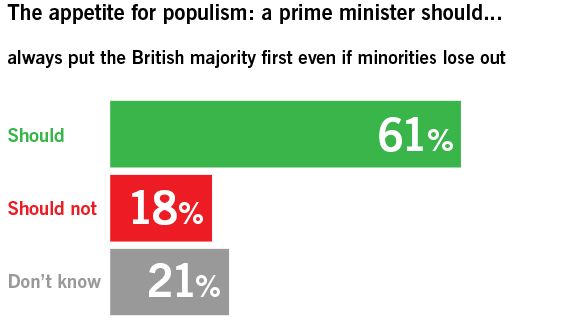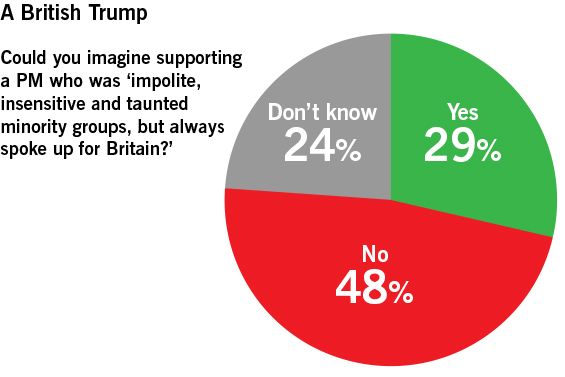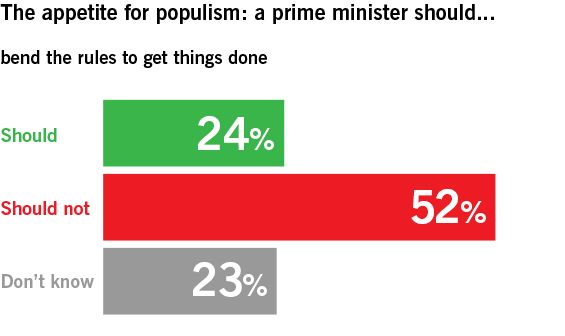Britain is in a mood for a nationalist prime minister who is prepared to see minorities lose out, according to new Deltapoll analysis of the potential of populist politics for Prospect magazine.
By 58 to 20 per cent, voters would expect the PM to “put Britain first, even if this means damaging relations with allies and friends.”

An even larger majority—61 to 18 per cent—say they think a leader should “put a majority of Britons first, even if that means the interests or views of minorities lose out.”

As Conservative jostling to replace Theresa May picks up pace, these numbers could embolden the likes of Boris Johnson, who has made controversial jokes about Muslim women and last summer suggested that Brexit might “get somewhere” if it were being run by Donald Trump, a populist President of whom he was “increasingly admiring.”
Be nice and obey the rules
Other Deltapoll numbers, however, will give any Tory who fancies themselves as a British Trump pause for thought.Asked to imagine a PM who was “sometimes impolite, insensitive and seemed to take pleasure in taunting minority groups, but who always made a point of speaking up firmly for Britain,” then overall, many more Britons—48 per cent—say they could not imagine voting for such a leader than the mere 29 per cent who say they could imagine voting for them.

And reassuringly for those in all parties who are committed to the norms of liberal democracy, a majority of 52 per cent thinks a prime minister should not “bend the rules to get things done,” as against just 24 per cent who think this is acceptable.

The survey comes the day before Prospect publishes its June issue, which investigates the lure of populism for a Conservative party in crisis, and on the day when the 1922 Committee is due to reconsider whether to rewrite its rules to allow an early challenge to Theresa May.
Because the final say over the next choice of Conservative leader sits with individual Tory party members, rather than MPs or the electorate as a whole, it is worth delving into the detail of the survey to see how far the appetite for populism varies among different segments of the electorate.
Focus on Conservative voters
The support for putting Britain first, even at the expense of alienating friends and allies, is overwhelming among older Brits (aged 65 plus) who are heavily over-represented in Conservative Associations—running at 77 per cent, as against just 10 per cent of pensioners who take the contrary view.The 65+ are just as convinced—by 77 to 11 per cent—that the majority must always come first, even if this means minority groups losing out.
Among Conservatives voters of all age, the split is fairly similar on the “minorities” question—with 73 per cent saying the majority must “always” come first; this rises to an extraordinary 84 per cent among those Tories who back Brexit.
While more voters than not tend to back than oppose both propositions across most parts of the electorate, there is spectacular variation. For example, less than half of the youngest respondents suggest that the majorities must always prevail over than minorities: just 41 per cent of voters under 25 take this view.
There are similar differences in attitudes to a nationalist foreign policy: less than half of Londoners (43 per cent) think No. 10 should always put Britain first even if this damages relations with allies.
And while the opposition to a prime minister “bending the rules” to get things done is pronounced across most groups, intriguingly, those who voted Ukip last time lean the other way: by 40 to 36 per cent they think it is worth bit.
Such variation raises the possibility that the same populism that is useful for winning a Conservative leadership election could become a hindrance in a subsequent general election.
That tension is developed in Steve Bloomfield’s piece in July’s Prospect about the politics of ethnic division and in Elinor Goodman’s dispatch from the disgruntled countryside, where she finds a strong social base for nostalgic conservatism but concludes that this could trap the Tories in the past.
A British Trump?
When it comes to backing “a British Trump”—an impolite sort, who was insensitive to minorities but would always speak up for Britain—voters in all age groups, even the oldest, are deeply reluctant. Politically, however, it is another story.Amongst all those who voted Conservative last time, it is a very even split—41 per cent would not back a British Trump, but 39 per cent would.
And if we concentrate on Conservative who back Leave, the potential populist prime minister fares better again: by 44 to 33 per Tory leavers could imagine backing such a leader. Meanwhile, among Ukip backers the split is 49 to 38 in favour.
Martin Boon of Deltapoll said: “populism is often described as a ‘divisive style of politics,’ and in a different way that is exactly what we’re seeing in these results. While the country seems to retain a very British distaste for brash Trumpian taunting, among Ukip supporters and Conservative Leavers there is a definite appetite for this approach.”
Given the gulf between the Conservative base and Britain as a whole, an awful lot hinges on whether a potential populist prime minister will face irresistible pressure to ask Parliament for an early election, or whether instead, they will be able to sit out the current term till 2022, as the law provides.
Backing for Boris
Asked specifically about Boris Johnson replacing Theresa May then a plurality—of 45 per cent—believe “the country should have the right” to an “immediate” election, and only 29 per cent believe that PM Johnson “should be free to carry on with the current Parliament,” through till 2022.So the pressure would be on, but if Johnson (or another new prime minister) were languishing in the polls they could draw comfort from the fact that views on the need for an early election divide sharply across party lines: 61 per cent of Labour backers believe one would be required, as against only 33 per cent of Conservatives, and a majority—53 per cent—of Tories believe the new prime minister should be free to carry on.
There is a similar divide on referendum lines: 57 per cent of Remainers would feel entitled an early election from prime minister Johnson, but only 43 per cent of Leavers.
Deltapoll interviewed an online sample of 2,029 adults aged 18+ online on 3-7th May 2018. The data is weighted to the profile of all GB adults. Deltapoll is a member of the BPC and abides by its rules












